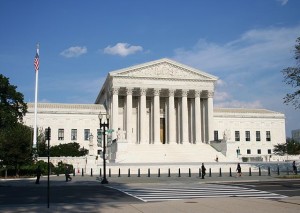Because amending the Constitution is so difficult, conservatives who believe illegal immigration is hurting the economy would like the U.S. Supreme Court to reinterpret the “birthright citizenship” clause of the 14th Amendment.
In effect, they want Chief Justice John Roberts to fix it for them — the same John Roberts many of them so roundly condemned for saving ObamaCare not once but twice through tortured legal reasoning.
It might work. Playing the high court is like playing the slots. It’s more a game of chance than logic or law.
The controversial opening sentence of the five-part 14th Amendment reads, “All person born or naturalized in the United States and subject to the jurisdiction thereof, are citizens of the United States and of the state wherein they reside.”

Although the court hasn’t specifically ruled on the issue of children born to illegal immigrants, it is interpreted these days to mean what it seems to say: If you’re born on U.S. soil, you’re entitled to citizenship, even if your parents snuck across the border.
Those who would narrow the definition could try to amend the Constitution, rather than going to court, and in fact an amendment resolution was introduced in 2009. It got nowhere, probably because it would require a two-thirds vote in both chambers of Congress and ratification by three-quarters of the state legislatures.
Many bills that would “clarify” the 14th Amendment by limiting birthright citizenship to, say, children of U.S. citizens or to legal resident aliens have been introduced over the past two decades, all to no avail. The bills allege that babies born to illegals aren’t really “subject to the jurisdiction of the United States.”
If they did pass, of course, those deprived of citizenship would take the law to court immediately as a violation of the 14th Amendment.
Another way for the issue to get to court — not very likely under the current administration — would be for the secretary of state’s office to deny a passport to the child of illegal immigrants born in the U.S. on grounds he or she wasn’t a citizen.![]()
That child, like those deprived of citizenship, would have standing to sue. Disgruntled citizens can’t take the issue to court because they have no standing.
The court has, in the 19th and early 20th centuries, addressed the 14th Amendment several times, particularly the “and subject to the jurisdiction thereof” phrase. In 1884’s Elk v. Wilkins the court denied birthright citizenship to a Native American who had left his tribe. The court ruled he still wasn’t a citizen because he had been born on tribal lands, which were considered alien nations. (It wasn’t until 1924 that Congress passed a law granting all Native Americans full citizenship.)
But in 1898, in U.S. vs. Wong Kim Ark, the high court granted citizenship to a child born to Chinese citizens who legally resided here. The majority held that a person born here is “subject to the jurisdiction” of the nation and thus a citizen. The minority maintained that a child born to foreign parents was subject to a higher jurisdiction, like children born to ambassadors stationed here. Though they may be subject to traffic and criminal laws, they can’t be drafted or pressed into jury duty in the U.S; they are subject to the claims of their parents’ country.
The 14th Amendment, passed in 1868, was drafted primarily to ensure the citizenship of former slaves, who were denied that right by the Dred Scott decision of 1857. It did not foresee illegal immigrants, who didn’t exist in that come-one, come-all era. Still, it doesn’t say that it applies only to slaves.
Donald Trump and many other Republican presidential candidates don’t like birthright citizenship and want the law reinterpreted to prevent it. Agreeing with them are, among many others, local radio talkers Peter Boyles and Mike Rosen.
Any future case involving birthright citizenship could easily turn on the votes of Roberts and finger-in-the-wind Justice Anthony Kennedy, since Supreme Court votes are often predictable on issues of this sort. It doesn’t matter what the law and previous decisions say; the justices tend to decide what policy they like, then work backward to find a legal justification.
It is ironic that a change in the law might depend on Roberts, who salvaged ObamaCare by standing the English language on its head. In the 2012 decision he conceded that the Commerce Clause doesn’t permit Congress to penalize citizens who do nothing. But since he wanted to save the law he concluded that the penalties for not buying health insurance were really taxes, which Congress can impose. It was an argument not even the government had used.
Then in this year’s King vs. Burwell, Roberts decided that Congress didn’t really mean it when it said, quite clearly, that federal subsidies could go only to Americans in states that had set up healthcare exchanges. The subsidies could go anywhere, he said. Only 16 states had set up exchanges at the time.
“Words no longer have meaning if an exchange that is not established by the state is ‘established by the state,’ ” wrote an angry Justice Antonin Scalia in his dissent. “It is hard to come up with a clearer way to limit tax credits to state exchanges than to use the words ‘established by the state.’ ”
Since words now mean whatever a majority of the justices want them to mean, those who want to revoke birthright citizenship can reasonably expect that five justices — depending on their mood — could rule that “subject to the jurisdiction thereof” doesn’t include children born to illegals here.
But to get a case to court, the Republicans first have to win the presidency as well as keep control of both the House and Senate.


